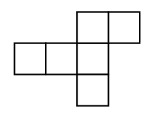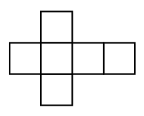Problems
Show how to tile a \(5\times12\) rectangle with the twelve pentominoes.
Show how to tile a \(4\times15\) rectangle with the twelve pentominoes.
Is it possible to tile a \(3\times20\) rectangle with the twelve pentominoes?
How can we tile the plane with this cube net?

How can we tile the plane with this cube net?

Queen Hattius has two prisoners and gives them a puzzle. If they succeed, then she’ll let them free. She will randomly put a hat on each of their heads. The hats could be red or blue. They will simultaneously guess the colour of their own hat, and if at least one person is correct, then they win.
Each prisoner can only see the other prisoner’s hat - and not their own. The prisoners aren’t allowed to communicate once they’re wearing the hats, but they’re allowed to come up with a strategy before.
What should their strategy be?
Two children come in from playing outside, and both of their faces are muddy. Their dad says that at least one of their faces is muddy. He’ll repeat this phrase until all of the children with muddy faces have come forward. Assuming that the children can’t see or feel their own face, but that they’re perfect at logic, what happens?
Prince Hattius tests his three wisest men with a hat puzzle. He tells them that he’ll put a hat on each of their heads, either green or yellow. These wise men, used to such puzzles, know that in such a setup they’ll be able to see the colours of the other two hats, but not their own.
Then the Prince says that at least one hat is green and the winner is the first person to work out the colour of his own hat. He adds on that this puzzle is fair to all of them - what happens?
This time three children with muddy faces run into the house. They are perfect logicians, but don’t yet know whether their own faces are muddy - yet they can see the other childrens’ faces.
Their dad says that at least one of them has a muddy face. And that he’ll keep repeating sentence every ten seconds until all children with muddy faces step forward.
Show that all three step forward after he’s said the sentence for the third time.
Three witches (Rosalind, Sabrina and Theresa) are having a duel between themselves. Rosalind is the most accurate, hitting her target \(100\%\) of the time. Sabrina is moderately accurate, hitting her target \(\frac{2}{3}\) of the time. Theresa still needs to practise, so only hits her target \(\frac{1}{3}\) of the time.
The witches take it in turns to fire shots. Once a witch has been shot, she can no longer fire shots. To make it fair given their respective accuracies, they agree that the order will be Theresa, Sabrina and Rosalind, and then repeat in that order until the end.
Why is Theresa’s best strategy to fire her first shot away from both of her opponents?